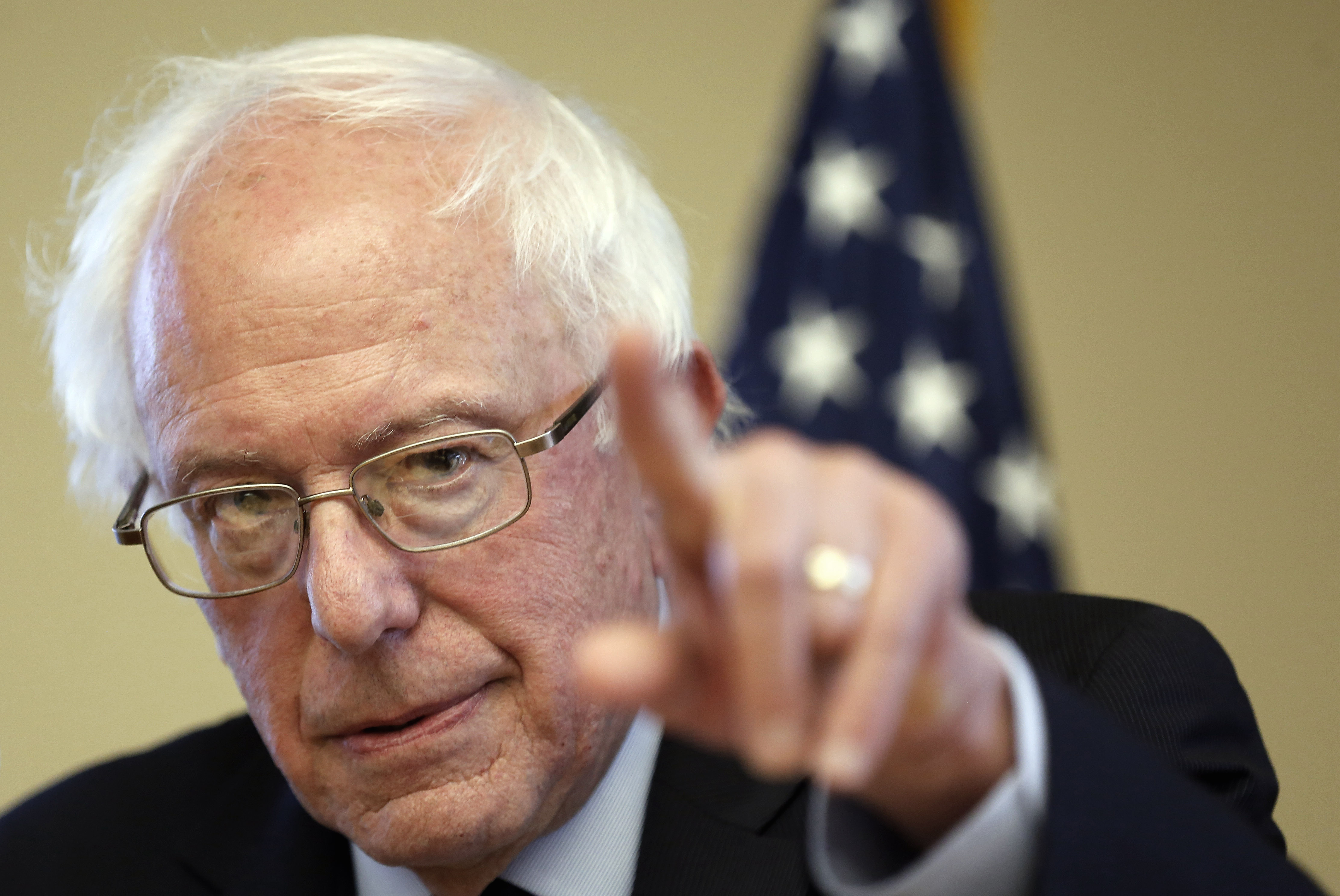Bernie Sanders' evasive maneuvers on national defense
Why won't Bernie Sanders clearly articulate his foreign policy?


A free daily email with the biggest news stories of the day – and the best features from TheWeek.com
You are now subscribed
Your newsletter sign-up was successful
It shouldn't have come as a surprise that in the first Democratic debates after the terrorist attacks in Paris, Senator Bernie Sanders (I-Vt.) was asked to comment. Yet the senator seemed almost thrown off by having to shift from his well-worn domestic issues stump speech. He pivoted to climate change. He pivoted to criticism of Hillary Clinton's leadership record. Anything to avoid presenting a comprehensive vision of how America should defend itself and its allies. It was an interesting evasion for someone running for commander in chief, and even more so for a self-described socialist. Socialism, after all, is an ideology that comes with a prepackaged foreign policy vision. The talking points are already written. Does Sanders' flub of the terrorism question, and his reluctance to fully embrace a socialist foreign policy, imply that maybe he's not quite the dove he makes himself out to be?
Bernie Sanders isn't the first socialist to run for president. His hero, Eugene Debs, ran for the office five times. Debs was also arrested and imprisoned for his opposition to the First World War. The speech that got him arrested, delivered in Canton, Ohio, in 1918, claimed that all wars waged throughout history had been for "conquest and plunder." Without equivocation, Debs claimed that wars — all wars, mind you — were waged without the full consent and in opposition to the interests of the classes that would actually be spilling blood: "The master class has always declared the wars; the subject class has always fought the battles. The master class has had all to gain and nothing to lose, while the subject class has had nothing to gain and all to lose — especially their lives."
Despite Bernie Sanders casting such a long shadow as of late, there are American Socialists still towing this hard, undiluted anti-war line. In fact, there's actually a Socialist Party in America, with its own candidate running for president. You'll be shocked to hear that they have a handbook. In the handbook, it's written, "Socialists have the job of educating the working class that wars are fought against their own interest — that the working classes of different countries have much more in common with each other than with their rulers." That's all wars, at least until a revolution in economic relations changes things.
The Week
Escape your echo chamber. Get the facts behind the news, plus analysis from multiple perspectives.

Sign up for The Week's Free Newsletters
From our morning news briefing to a weekly Good News Newsletter, get the best of The Week delivered directly to your inbox.
From our morning news briefing to a weekly Good News Newsletter, get the best of The Week delivered directly to your inbox.
So what about Sanders? He has gestured at being opposed to war in general — and perhaps within the context of an interventionism-prone Congress he does come off as a dove — but the details tell a more complicated story. The senator might have opposed the 2003 invasion of Iraq and Operation Desert Storm, but he supported the invasion of Afghanistan and the bombing of ISIS. Protesters, whom he later had arrested, occupied his office when he supported bombing Kosovo. He voted in favor of the Iraq Liberation Act in 1998 and the Iran Freedom Support Act, which funneled money to "pro-liberation" groups like the oddball murder cult Mujahideen-e-Khalq. These interventionist tactics that Sanders supported don't literally constitute American boots on the ground, but anyone who claims to be a socialist should understand that financing proxy wars, enforcing counterproductive sanctions, and conducting massive bombing campaigns don't fit within the traditional purview of the class struggle.
And neither does being an international arms dealer. The F-35 Joint Strike Fighter has been, to put it mildly, a boondoggle. Costing taxpayers nearly half a trillion dollars to develop and sustain, it's the most expensive weapon in human history. And it doesn't even work. Plagued by faulty targeting systems, bunk helmet displays, and an aversion to bad weather (it can't fly within 25 miles of a bad storm), the F-35 might go down in history as the worst lemon ever sold to the American people.
But the program's size is precisely what sustains it. With contractors spread out all over the country, Congress has a financial interest in keeping the program running. A socialist might rail against the set up, calling it a racket that funnels vast amounts of public funds into private hands while constructing war machines that will, if they function correctly, wind up defending the economic status quo. But Senator Bernie Sanders is a longtime supporter of the F-35, and has even maneuvered to get some of the planes stationed at the Burlington International Airport. There's nothing socialist about full-throated support of the military-industrial complex, especially when the companies you champion are quite explicit about Middle Eastern conflict being good for business.
When Sanders took the time to explain his homemade, ersatz socialism, he compared his own foreign policy positions to FDR's, claiming that no one better understood "the connection between American strength at home and our ability to defend America at home and across the world." But FDR wasn't a socialist, and his foreign policy was a far cry from Eugene Debs. Ensconced as Sanders is in the business of war and the ideology of intervention, one has to wonder if his reputation as a dove is a projection that he's been more than happy to allow the public to cultivate — letting his supporters make assumptions about his preferences in order to avoid clearly articulating his positions.
A free daily email with the biggest news stories of the day – and the best features from TheWeek.com
Scott Beauchamp is a writer based in Portland, Maine. His work has appeared in The Atlantic, The Guardian, and The Paris Review, among other places.
-
 5 cinematic cartoons about Bezos betting big on 'Melania'
5 cinematic cartoons about Bezos betting big on 'Melania'Cartoons Artists take on a girlboss, a fetching newspaper, and more
-
 The fall of the generals: China’s military purge
The fall of the generals: China’s military purgeIn the Spotlight Xi Jinping’s extraordinary removal of senior general proves that no-one is safe from anti-corruption drive that has investigated millions
-
 Why the Gorton and Denton by-election is a ‘Frankenstein’s monster’
Why the Gorton and Denton by-election is a ‘Frankenstein’s monster’Talking Point Reform and the Greens have the Labour seat in their sights, but the constituency’s complex demographics make messaging tricky
-
 The billionaires’ wealth tax: a catastrophe for California?
The billionaires’ wealth tax: a catastrophe for California?Talking Point Peter Thiel and Larry Page preparing to change state residency
-
 Bari Weiss’ ‘60 Minutes’ scandal is about more than one report
Bari Weiss’ ‘60 Minutes’ scandal is about more than one reportIN THE SPOTLIGHT By blocking an approved segment on a controversial prison holding US deportees in El Salvador, the editor-in-chief of CBS News has become the main story
-
 Has Zohran Mamdani shown the Democrats how to win again?
Has Zohran Mamdani shown the Democrats how to win again?Today’s Big Question New York City mayoral election touted as victory for left-wing populists but moderate centrist wins elsewhere present more complex path for Democratic Party
-
 Millions turn out for anti-Trump ‘No Kings’ rallies
Millions turn out for anti-Trump ‘No Kings’ ralliesSpeed Read An estimated 7 million people participated, 2 million more than at the first ‘No Kings’ protest in June
-
 Ghislaine Maxwell: angling for a Trump pardon
Ghislaine Maxwell: angling for a Trump pardonTalking Point Convicted sex trafficker's testimony could shed new light on president's links to Jeffrey Epstein
-
 The last words and final moments of 40 presidents
The last words and final moments of 40 presidentsThe Explainer Some are eloquent quotes worthy of the holders of the highest office in the nation, and others... aren't
-
 The JFK files: the truth at last?
The JFK files: the truth at last?In The Spotlight More than 64,000 previously classified documents relating the 1963 assassination of John F. Kennedy have been released by the Trump administration
-
 'Seriously, not literally': how should the world take Donald Trump?
'Seriously, not literally': how should the world take Donald Trump?Today's big question White House rhetoric and reality look likely to become increasingly blurred